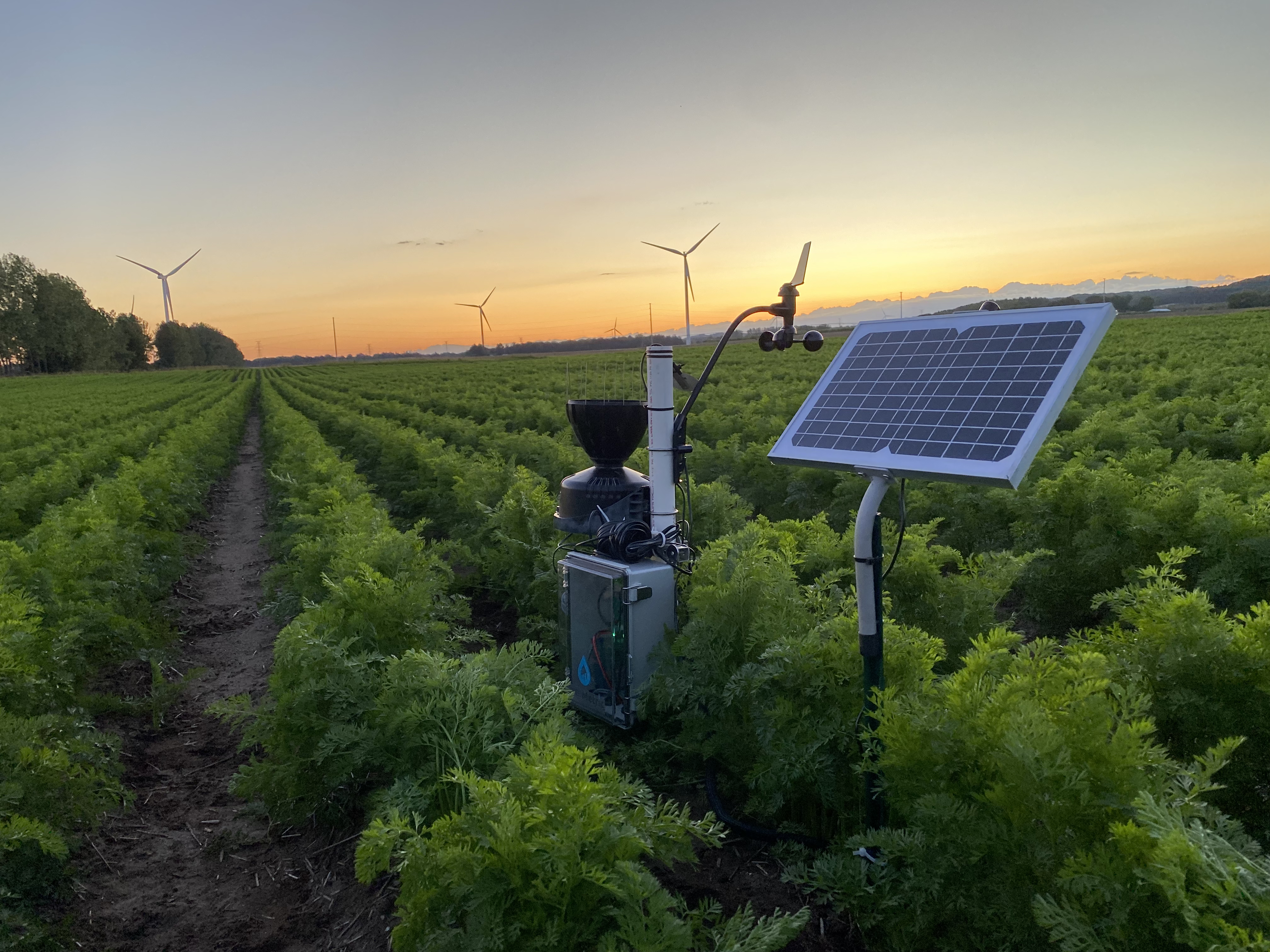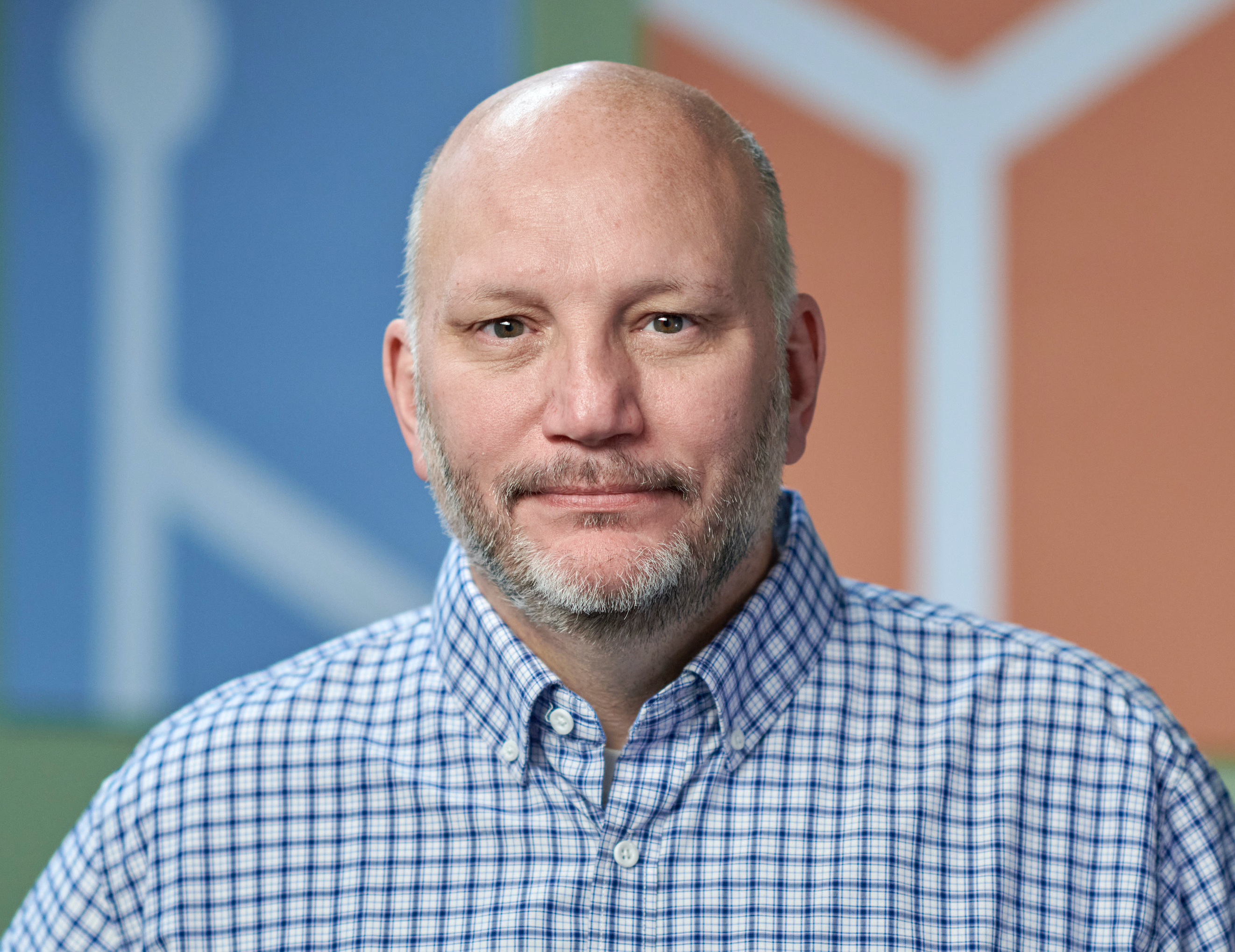
The origin of EarthMetric Innovation’s Bluewise System is in the fields of farmers. “Engineers develop some tangible solutions to what society needs. I guess that was kind of always my motto for my career,” says Younsuk Dong, Ph.D., EarthMetric co-founder and Assistant Professor of Biosystems and Agricultural Engineering at Michigan State University’s (MSU) College of Engineering. Dong has spent countless hours engaging with producers and growers to understand the growing challenges that climate change and an increasing focus on sustainable water management has had on farmers. “The motivation for this technology was the farmers themselves,” Dong explains. “They told us what they needed, and we set out to create it.”
The idea behind the Bluewise system is simple: provide growers with real-time, continuous monitoring of soil moisture, leaf wetness, field temperature, and humidity with data collected at the field level. Based on technology developed at MSU in 2020 called LOCOMOS (Low-Cost Monitoring System) with Dr. Dong and colleagues Steve Miller and Lyndon Kelley, the technology aimed to help farmers determine optimal crop watering patterns, deciding when crops need water and how much water to use. Combining advanced sensors, machine learning algorithms, and hyper-local weather data, LOCOMOS was developed to help growers optimize their irrigation and crop management practices, ultimately reducing water waste and the use of harmful chemicals.
“We realized that LOCOMOS was already showing utility on farms growing corn and soybeans and recognized the broader potential for a range of fruits and vegetables across the United States,” explained Jon Debling, Technology Manager at MSU Technologies.
Dong admits that commercializing his technology wasn’t something he had ever considered. However, after hearing the overwhelmingly positive feedback from growers, Dong realized that commercialization of the LOCOMOS technology would be the best avenue to get his solution into the hands of the growers who need it most.
“A key step in commercializing the technology was recognizing what technical work was required to bring the LOCOMOS technology closer to a viable product. We identified the steps needed and worked towards developing a more commercially ready prototype,” said Debling.

With the assistance of the MSU Innovation Center, Dong was able to leverage the extensive network of resources available to faculty inventors through MSU’s Innovation Ecosystem. Utilizing translational research funding from the Michigan Translational Research and Commercialization (MTRAC) program, supported by the Michigan Economic Development Corporation (MEDC), Dong was able to develop an app in collaboration with Dr. Zhichao Cao in Computer Science and Engineering at MSU that allows users to check moisture conditions, see recommended watering and pesticide spray timings, and make watering decisions from a grower’s smartphone.
“The development of the Bluewise technology illustrates how MTRAC AgBio funding can catalyze the successful commercialization of technology developed by university researchers across the state,” says Joe Affholter, Commercialization Program Director for the MTRAC AgBio Innovation Hub at the MSU Innovation Center. “In this case, Dr. Dong and his colleagues used an initial tranche of MTRAC AgBio funding to conduct exploratory trials with farmers using an early version of the technology and then used a larger, second tranche to develop a field prototype that was responsive to the needs their customers expressed. That prototype has now led to the development of an industry-altering product and the launch of a new business. The team has done a marvelous job stewarding the funds and meeting a real need through well-targeted innovation.”
Dong also received additional funds through the MSU Targeted Support Grants for Technology Development program (TSGTD) to develop electronic diagrams for prototype hardware.
Support from translational grants such as MTRAC and TSGTD provided Dong’s team with the necessary funding to move LOCOMOS from the lab to becoming a real-world commercial product. “Many other research grants do not allow you to spend funding on developing circuit boards. There are not many grants out there that do. MTRAC helped us with funding for prototype development, which was really helpful,” says Dong.
MSU Technologies, working in partnership with the MSU Research Foundation’s venture creation entity, Spartan Innovations, continued to work closely with Dong through the initial stage of startup formation. With assistance from the NSF Regional and National I-Corps programs, Dong’s team interviewed more than 100 farmers to further explore the market potential for the LOCOMOS technology and begin forming a business plan.
“Understanding how technology solves problems in the market is critical to starting a business,” says Brad Fingland, Director of Venture Creation at the MSU Research Foundation. “The support of the Foundation, the Innovation Center, and the NSF I-Corps program helped guide EarthMetric to a commercially viable product.”

Earthmetric Founder & CEO
The MSU Research Foundation also paired Dong with Mentor-in-Residence (MIR) Matt Rudd, who served as a business consultant for the fledgling startup. Rudd reached out to Matt Henry, who had 25 years of experience in manufacturing and 3D printing, to assist with bringing LOCOMOS to market.
Henry quickly hit it off with Dong and discovered they both shared a passion for the LOCOMOS technology’s ability to make a positive impact on climate change and agriculture. “After just two weeks of starting my consulting with them and trying to get the business up and running, we were discussing the need to find a CEO and founder, and I said, ‘What about me?'” Henry recounts.
With Henry now at the helm as CEO, the MSU Research Foundation continued to provide assistance and support to the team as they prepared to enter the market by providing the first pre-seed investment through its venture investment subsidiary, Red Cedar Ventures.
“The Foundation provides a lot of different areas to support. When I have questions or need extra resources, they have a network of people in all different areas that can help me and give me some guidance or introduce me to somebody else,” says Henry.
With the final pieces in place, the startup was ready to launch. In 2023, EarthMetric was founded to help people and the environment. Based on the LOCOMOS technology, now called Bluewise, EarthMetric wants to see its platform in fields across the US and globally to increase crop yield, reduce chemical use, and sustainably manage water use.
“We were able to move from incorporating a company to market in six months. Even coming from a pre-existing company going from prototype to commercial product in six months would be pretty phenomenal. But we weren’t taking a variant of another product and saying we have a new product. This was going from idea to startup in just six months. I think that’s been a testament to MSU Technology’s help with the development of Younsuk’s technology and to what the Foundation laid out for us, from their processes and the support they gave us,” says Henry.
Since its launch, Bluewise has been met with enthusiasm from growers, with more than 80 units in the field. Some of Bluewise’s success is due to its low cost compared to other competing technologies.
“So many of our competitors are much higher cost, which often prices those technologies out of reach of many farmers since farming can be a low margin, high volume business. So, farmers are watching every penny, and they want to see a quick return on investment,” explains Henry.
The Bluewise system helps farmers save money by helping to reduce water and chemical usage. ”I think this is where technology really shines,” says Dong. He continues, “Farmers always wonder how much rain they receive to determine whether the leaves are dry enough for fungicide or pesticide application. And if they get some rain, they want to be able to factor that rain amount into their irrigation management plan. Bluewise is more of an all-in-one technology that helps irrigation and other farm management practices like fungicide application timing. There are other technologies that can do irrigation, but Bluewise can do both irrigation and fungicide application management and provide a measurement of all the other pertinent weather data on an individual field level.”
“Other systems track weather, but they don’t do it to the same level that we’re doing it, right there on each unit in the field. Some competing solutions are not even using weather stations; they’re tapping into weather networks,” adds Henry. “But what’s more is that we’re also analyzing the data, providing farmers answers and we’re presenting it in a format that is easily readable for them. Now they can glance at their phone through our app and see actionable recommendations instead of trying to interpret what the raw data is saying.”
Both Dong and Henry are looking forward to the prospect of making a difference through EarthMetric. “We’re more than just an agricultural company. That’s why the name is EarthMetric. It’s all about what we can do that’s associated with the climate, helping with climate change, helping with the environment, everything from agriculture through the environmental stages of the earth. By reducing fungicide and fertilizer usage and optimizing those with sustainable water use, you’re making a better environment for everybody. Also, by increasing the crop yield or the output per acre, we can help growers produce more food from a global food supply chain. Saving the planet, feeding the people,” says Henry.
This story originally appeared in the 2024 MSU Innovation Center Annual Report — a showcase of groundbreaking ideas, powerful partnerships, and the Spartan spirit of innovation.
The stories highlighted in this report are a testament to the innovators, researchers, and partners who make it all possible. Together, we’re creating a future where ideas move from concept to reality — benefiting Michigan and beyond.
Read the full report HERE.
About the MSU Innovation Center:
The MSU Innovation Center combines research partnerships, technology transfer, and startup support for MSU faculty who aim to see their research applied to make the world a better place.
Composed of Business Connect, MSU Technologies, and Spartan Innovations, the MSU Innovation Center aims to amplify the impact of faculty research and drive economic growth while positively impacting society to solve real-world challenges with cutting-edge ideas.
Through mutually beneficial, long-term partnerships with the private sector, we connect MSU faculty with companies for corporate-sponsored research collaborations. We also play a key role in facilitating the commercialization and public use of technologies and copyrightable materials, moving MSU’s innovations from the lab to the marketplace. Importantly, we provide significant support for faculty entrepreneurs in establishing startup companies based on technologies developed at MSU.
